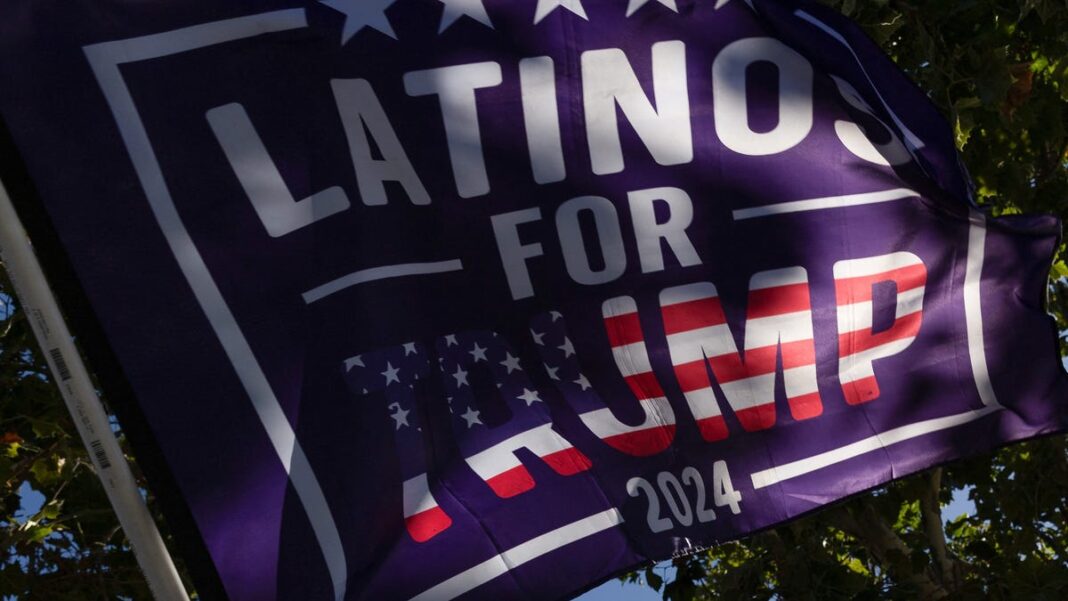Changing allegiances among voters aided Donald Trump’s election success
WASHINGTON ― A shift among Latino voters, alongside a modest change among Black voters in crucial swing states, significantly boosted Donald Trump’s election victory over Kamala Harris, as the Republican candidate gained traction by winning over voters from traditionally Democratic groups.
Evidence of this shift may have been present from the start.
While Harris focused on portraying Trump as a vengeful and dangerous figure during her campaign, surveys consistently indicated that voters favored Trump over her when asked who could better tackle the pressing issues of rising costs and inflation.
Though Trump did not secure a majority within either demographic, he garnered support from approximately 13% of Black voters nationwide and 45% of Latino voters, as reported by CNN exit polls. In contrast, during the 2020 election, Trump received only 8% of Black voters and 32% of Latino voters.
Historically, Black voters have been the Democratic Party’s most reliable supporters, often playing a crucial role in delivering victories for Democratic candidates.
Trump’s successes in these communities were largely attributed to support from Black and Latino men, which enabled him to surpass his previous performance in cities like Philadelphia, Milwaukee, and Detroit.
In a notable development, Trump won Latino men by a margin of 54%-44% against Harris, according to NBC exit polls, reversing their previous backing of President Joe Biden, who secured 59%-36% against Trump in 2020. Additionally, Trump received 20% of male Black voters’ support nationwide, reflecting similar numbers from the 2020 election against Biden.
Overall, Trump’s improved standing indicates that his appeal to working-class voters is extending beyond white individuals without college degrees, signaling a potential risk for Democrats in future elections.
Trump achieved a 55%-42% victory among blue-collar voters without college degrees, while Harris gained the support of more affluent voters with college degrees at a rate of 57%-40%. In 2020, Trump narrowly won those without college degrees by 50%-48% over Biden.
However, the most significant and impactful shift since 2020 was among Latino voters.
Trump’s gains among Latino voters occurred despite his stringent rhetoric regarding immigration. The Harris campaign attempted to leverage a controversial joke made by comedian Tony Hinchcliffe during a Trump rally, where he described Puerto Rico as a “floating island of garbage.”
Arturo Munoz, a truck driver from Phoenix, Arizona, expressed that Trump’s overall message addressing high living costs resonated with him and other Latino men, who are still facing economic hardships. Munoz, 28, noted the difference in how much his paycheck could support him has changed from 2016 to 2020 and again from 2020 to 2024.
He mentioned that the remark made at Madison Square Garden did not overshadow Trump’s broader message.
“Hispanic and Latino men are very physically hard working,” Munoz stated, adding that “Hispanic guys are putting in hard work every day.” He noted the variations in pay, hours, and resources to support their families that he has witnessed.
Latino men are more likely to hold low-wage and labor-intensive construction and maintenance jobs compared to their counterparts across the U.S.
Munoz transitioned from working at a gas station between 2016 and 2020 to becoming a truck driver, which was supposed to offer better compensation and opportunities. However, with the current economic conditions, he stated he would prefer his previous job from 2016.
“I’m confident many Hispanics feel similarly,” he remarked. “They would choose the pay, work hours, and overall benefits of their work from 2016 to 2020 compared to what they have experienced in these last four years.”
Trump’s appeal to Latino voters extended beyond critical battlegrounds like Arizona and Nevada, as in South Texas—once a Democratic stronghold—Trump flipped Starr County, which had voted Democratic in every presidential election since 1896.
Former President Barack Obama issued a warning last month regarding Harris’ challenges with Black men, suggesting they are “coming up with all kinds of reasons and excuses” not to support her and indicated that some may be hesitant due to her gender.
In Pennsylvania, 24% of Black men supported Trump, while 73% backed Harris, according to a CNN exit poll, indicating more than double the support for Trump compared to the previous election.
To regain some ground with this demographic, Harris introduced an economic initiative aimed at Black men, which included proposals for the legalization of recreational marijuana, one million “fully forgivable” loans for Black entrepreneurs, and new regulatory measures for cryptocurrencies to safeguard investors.
Melvin Prince Johnakin, second vice president of the Philadelphia
The NAACP pointed out that issues regarding crime and immigration have contributed to Black men moving away from the Democratic Party, along with a sluggish recovery from the COVID-19 pandemic.
“Ultimately, we chose to take a stand,” stated Johnakin. “We had a strong leader in Donald Trump.”
Following the COVID-19 pandemic in 2020, there has been a noticeable decline in higher education enrollment among Latino men. Data from the Pew Research Center shows that only 20% of Latino men aged 25-29 have a college degree, in contrast to 27% of Latinas in the same age group.
In general, 79% of Hispanic adults lack a bachelor’s degree, while 62% of U.S. adults aged 25 and up do not hold one either.
Gustavo Rivera, a Democratic State Senator from New York representing the Bronx, recently voiced his worries in an interview about the insufficient continuous outreach to Latino voters outside of election periods. He emphasized the necessity for a stronger connection to prevent diminishing support for the Democratic Party.
“There’s no doubt about it,” Rivera affirmed.

